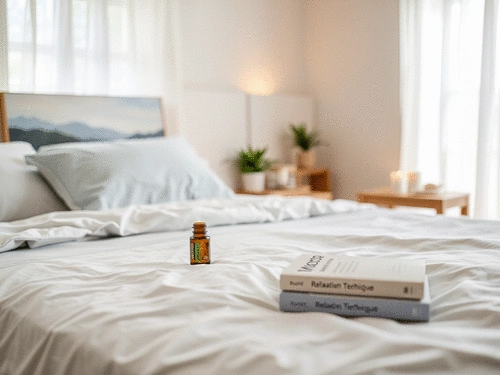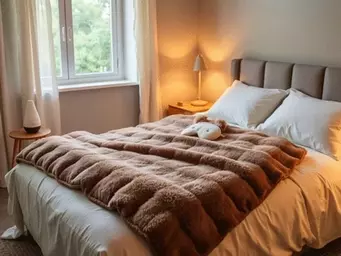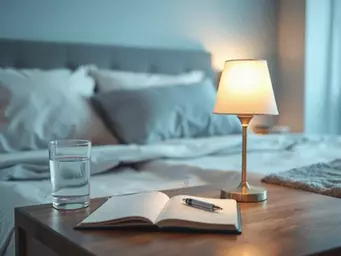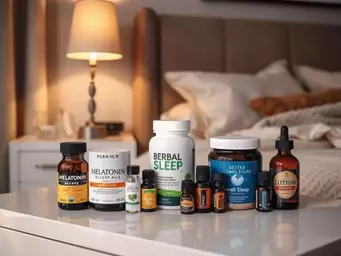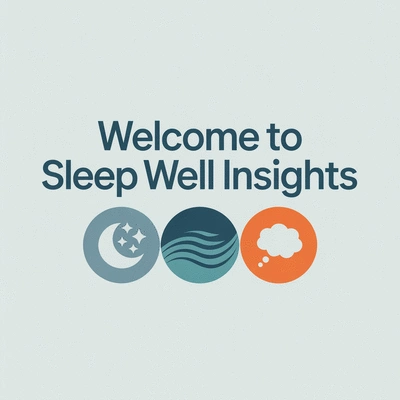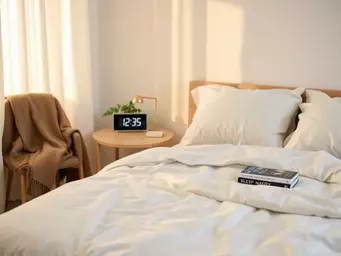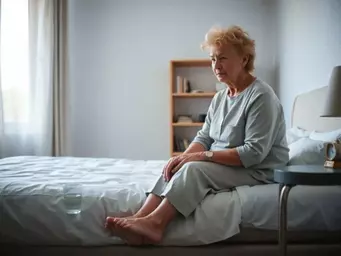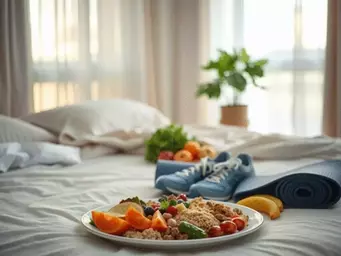Did you know that incorporating relaxation techniques into your nightly routine can significantly improve your sleep quality? Understanding the link between relaxation and sleep can transform your approach to restful nights.
What You Will Learn
- Relaxation techniques can trigger the body's natural relaxation response, reducing stress and anxiety that interfere with sleep.
- Common sleep disturbances, such as insomnia and sleep apnea, can negatively impact your overall health and well-being.
- Good sleep hygiene practices, including maintaining a consistent sleep schedule and reducing screen time, enhance relaxation and sleep quality.
- Personalizing your relaxation techniques is essential; different methods work for different individuals, so experimentation is key.
Key Relaxation Techniques for Sleep Improvement
Discover effective methods to enhance your sleep quality by integrating these relaxation techniques into your nightly routine.
Mindfulness Meditation
Helps calm the mind, reducing anxiety and promoting a sense of peace conducive to sleep.
Progressive Muscle Relaxation (PMR)
Systematically tenses and relaxes muscle groups to relieve physical tension and stress.
Deep Breathing Exercises
Simple yet powerful, these exercises stimulate the relaxation response, decreasing heart rate.
Guided Imagery
Allows visualization of serene environments, distracting from racing thoughts for a restful state.
Understanding the Link Between Relaxation Techniques and Sleep Quality
Have you ever tossed and turned at night, your mind racing with worries? Relaxation is crucial for better sleep, and understanding this connection can be the first step in improving your sleep quality. When our bodies are tense and our minds are busy, drifting off into a restful state becomes nearly impossible. That's why incorporating effective relaxation techniques into your nightly routine can make a significant difference.
In my journey as a sleep health advocate, I've seen how vital relaxation practices are in combating insomnia. By calming your mind and body, you pave the way for a peaceful night’s sleep, which is essential for overall health and well-being!
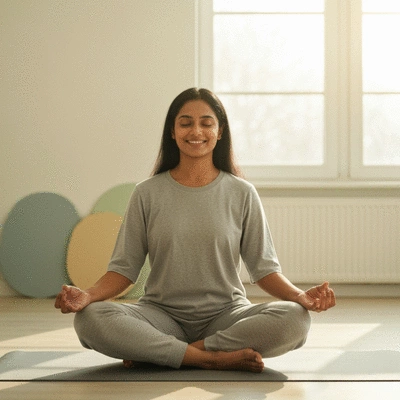
Why Relaxation is Crucial for Better Sleep
Relaxation techniques help to trigger the body's natural relaxation response, which can reduce stress and anxiety that often interfere with sleep. Stress management through relaxation can lead to deeper and more restorative sleep cycles, allowing you to wake up feeling refreshed. Let's explore some key reasons why relaxation is so important:
- Reduces stress hormones in the body
- Promotes a calming effect on the nervous system
- Enhances overall mental clarity and focus during the day
- Encourages a smoother transition into sleep
By addressing relaxation proactively, you can set the stage for a better night's sleep. Just imagine how much better you could feel if you could finally quiet those racing thoughts before bed!
Common Sleep Disturbances and Their Impact on Health
Many of us experience sleep disturbances, whether due to anxiety, environmental factors, or even physical discomfort. Sleep disturbances can significantly impact our health, leading to a range of issues like fatigue, irritability, and impaired cognitive function. Here are a few common disturbances that might disrupt your sleep:
- Insomnia: Difficulty falling or staying asleep
- Sleep Apnea: Interrupted breathing during sleep
- Restless Legs Syndrome: Uncontrollable urges to move your legs
- Nightmares: Disturbing dreams that wake you up
Understanding these disturbances is crucial for addressing them effectively. By recognizing their effects, you can take concrete steps to enhance your sleep quality and overall health.
The Role of Sleep Hygiene in Relaxation and Sleep Quality
Sleep hygiene refers to the practices and habits that promote consistent, uninterrupted sleep. Good sleep hygiene can work hand-in-hand with relaxation techniques to create an optimal sleep environment. Here are some essential sleep hygiene practices:
- Establish a consistent sleep schedule
- Create a comfortable sleep environment
- Avoid stimulants such as caffeine and nicotine before bed
- Limit screen time in the hour leading up to bedtime
- Engage in a calming pre-sleep routine
By focusing on these practices, you can enhance your ability to relax and ultimately improve your sleep quality. It's about creating a peaceful sanctuary where sleep can flourish. Remember, small changes can lead to significant improvements!
Pro Tip
To enhance the effectiveness of your relaxation techniques, consider incorporating aromatherapy into your routine. Scents like lavender and chamomile are known for their calming properties and can significantly improve your pre-sleep relaxation experience. Try using essential oils in a diffuser or applying them to your pillow before bedtime for a soothing ambiance.
Recap of Key Relaxation Techniques for Sleep Improvement
As we dive deeper into the world of relaxation techniques, it's essential to highlight the benefits each approach brings to improving sleep quality. From mindfulness meditation to guided imagery, these practices can significantly enhance your ability to fall asleep and stay asleep. Let’s recap some of the most effective techniques:
- Mindfulness Meditation: This practice helps calm the mind, reducing anxiety and promoting a sense of peace that’s conducive to sleep.
- Progressive Muscle Relaxation (PMR): By systematically tensing and relaxing muscle groups, PMR can relieve physical tension and stress that hampers sleep.
- Deep Breathing Exercises: Simple yet powerful, these exercises stimulate the relaxation response, decreasing heart rate and improving overall calmness.
- Guided Imagery: This technique allows you to visualize serene environments, distracting your mind from racing thoughts and facilitating a more restful state.
Each of these methods offers a unique way to address the root causes of insomnia. By integrating them into your nightly routine, you're not just hoping for better sleep; you're taking actionable steps to achieve it!
Encouraging a Personalized Approach to Relaxation
At Sleep Well Insights, I believe that personalization is key when it comes to relaxation and sleep. What works wonders for one person might not resonate with another. It’s about finding the right fit for your unique situation. For instance, if you’re dealing with chronic pain, specific relaxation techniques may need to be adjusted to ensure comfort and effectiveness.
- Try a Variety of Techniques: Experimenting with different relaxation practices can help you discover what resonates best.
- Listen to Your Body: Pay attention to how you feel after trying a new technique; this feedback is invaluable.
- Stay Flexible: Your needs may change over time, so be open to adjusting your approach as necessary.
Remember, the goal is to create a tailored relaxation routine that not only aids in falling asleep but also enriches your overall well-being. Take your time exploring, and don’t hesitate to reach out to a healthcare professional if you need guidance on which techniques may suit you best.
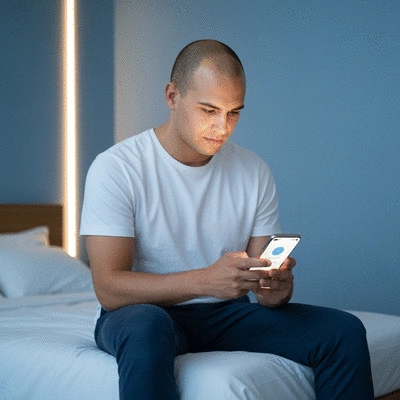
Frequently Asked Questions About Relaxation and Sleep
- Q: How do relaxation techniques improve sleep quality?
- A: Relaxation techniques trigger the body's natural relaxation response, reducing stress hormones and calming the nervous system. This creates a state conducive to falling asleep more easily and experiencing deeper, more restorative sleep cycles.
- Q: What are some common relaxation techniques for sleep?
- A: Common techniques include mindfulness meditation, progressive muscle relaxation (PMR), deep breathing exercises, and guided imagery. Each helps to reduce physical and mental tension.
- Q: What is sleep hygiene and why is it important?
- A: Sleep hygiene refers to practices and habits that promote consistent, uninterrupted sleep. It's important because it creates an optimal environment for sleep, complementing relaxation techniques and improving overall sleep quality.
- Q: Can sleep disturbances impact overall health?
- A: Yes, sleep disturbances like insomnia and sleep apnea can significantly impact health, leading to fatigue, irritability, impaired cognitive function, and other health issues.
- Q: Should I personalize my relaxation routine?
- A: Absolutely. Personalizing your approach is key. Experiment with various techniques, listen to your body's responses, and remain flexible to find what works best for your unique needs and preferences.
Taking the Next Steps Towards Better Sleep Quality
Consulting Healthcare Providers for Tailored Advice
As you embark on your journey towards better sleep quality, consulting with healthcare providers can be an invaluable step. They can offer tailored advice based on your personal health history and specific sleep challenges. Whether it's medication or lifestyle changes, professional insights can help ensure you're on the right track. For further information on the effectiveness of Cognitive Behavioral Therapy for Insomnia (CBT-I), a common recommendation, you can refer to research published in the Journal of Clinical Sleep Medicine.
Getting Started: Resources and Tools for Practice
To support your relaxation and sleep efforts, consider exploring various resources and tools. From books on sleep health to guided meditation recordings, there’s a wealth of materials available to assist you. These resources can provide structured guidance that complements your personal practices.
Exploring Sleep Apps and Technology for Better Sleep Management
In our tech-driven world, several sleep apps can aid in tracking your sleep patterns and reminding you to practice relaxation techniques. Utilizing technology can help you stay accountable and motivated! Here are some popular options you might find useful:
- Sleep Cycle: An app that analyzes your sleep patterns and wakes you at the optimal time.
- Calm: Offers guided meditations specifically for sleep and relaxation.
- Pillow: Tracks sleep quality and provides insights for improvement.
By leveraging these tools, you can enhance your sleep hygiene and create an effective sleep routine tailored just for you!
Recap of Key Points
Here is a quick recap of the important points discussed in the article:
- Relaxation techniques are essential for improving sleep quality by reducing stress and anxiety.
- Common sleep disturbances include insomnia, sleep apnea, and restless legs syndrome, which can negatively impact health.
- Practicing good sleep hygiene, such as maintaining a consistent schedule and creating a calming environment, supports better sleep.
- Effective relaxation techniques include mindfulness meditation, progressive muscle relaxation, deep breathing exercises, and guided imagery.
- Personalizing your relaxation routine is crucial; what works for one may not work for another, so be willing to experiment.

